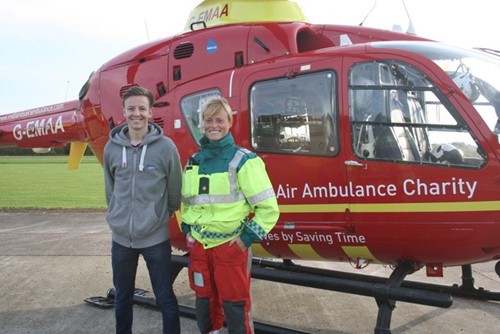


Teamwork to the highest capacity
On Sunday 13th August 2017, 17-year-old Ben Culff was at work at Drayton Manor Theme Park’s hotel. He had a history of non-epileptic seizures and collapsed and was tragically in cardiac arrest in one of the hallways. Thankfully, his colleague, 16-year-old Jasmine Finlan-Tuck was by his side and rushed for help, including manager Christian Green.
Hotel chef, Josh Briggs made the 999 call, which was received by West Midlands Ambulance Service at 12.28pm. Thanks to his calm approach and insight, accurate information was given to the 999 operative, which led to the right emergency service resources being deployed to the incident, and appropriate advice was also provided over the phone to help them treat Ben in the moment.
Colleague, Ryan Haynes, also just 17 at the time, looked after Jasmine while a further colleague Matthew Harris started to manually administer CPR. This quick thinking meant Ben’s brain and organs received vital oxygen to reduce the damage caused by his cardiac arrest. After a few minutes, a defibrillator that was based on site was brought to Ben. The Automated External Defibrillator (AED) was applied and shocked him twice within the first ten minutes of his cardiac arrest and before any ambulance resources arrived on scene. Quick use of the AED in conjunction with CPR got Ben’s heart started again fast, which further helped to prevent brain and organ damage from lack of oxygen. They demonstrated initiative and the ability to remain calm under pressure while they we dealing with a seriously ill colleague and friend.
By the time the first ambulance arrived, Ben thankfully had a pulse again and was now breathing, but was in a severely agitated state, which is common for those who have suffered a cardiac arrest. This scene would have shocked most people, but Jasmine, Christine, Josh and Matthew, as well as colleagues and qualified first aiders Chelsey Harper, Nicci Meads and John Cooper, remained by his side and continued to look after him, keeping him safe and out of harm’s way in his agitated state.
The aircrew from MAAC’s Tatenhill airbase, including critical care paramedics, Ian Jones and Karen Baker, arrived on scene just a matter of minutes after the initial 999 call. Staff at Drayton Manor prepared a landing site and helped to manage people on the ground so they did not delay the landing. They also used their initiative and brought a golf buggy to the helicopter to transport the aircrew to the incident scene quickly.
With the aircrew team taking over Ben’s care, Christian used his initiative to contact Ben’s family, and was able to relay very important information about Ben’s medical history to the clinicians.
Karen and Ian initially gave Ben sedative drugs, but he continued to be agitated, and ended up ripping out six cannulas from his arm that were being used to provide him with medication. Unfortunately, this did not have the desired response, so MAAC’s RAF Cosford based aircraft was called as back up.
Again, the park’s staff thought ahead and secured a second landing site and brought the second aircrew to the scene quickly. Dr Paul Dias was on board the RAF Cosford helicopter and undertook rapid sequence induction (RSI) on Ben. This technique, which can only be administered by a doctor, involves anaesthetising the patient to put them to sleep, before paralysing them so that they could incubate them with tubes without agitation. By stabilising Ben, the aircrew were able to get Ben ready for the flight. During this time, staff prepared the park to allow the flight paramedics and doctor to extricate Ben from the hotel and load him onto the aircraft before transferring him to Stoke Hospital to receive definitive care.
Ben spent the next eleven days in hospital before being fitted with an ICD, a small device, which can treat people with dangerously abnormal heart rhythms. He was then able to continue his recovery at home.
Critical care paramedic, Karen Baker, said of the incident: “Ben was extremely poorly. A cardiac arrest is when someone’s heart actually stops, and it can be very difficult to actually restart it. The actions taken on the day by the staff at Drayton Manor were incredible. They worked as a team, under extremely pressured circumstances to enable Ben to live and make the best possible recovery. If they hadn’t done what they did, we wouldn’t have had a patient to work on when we arrived. We’re extremely proud of them.”